I know what you are thinking. If a card hasn't gained value in half a century, why would that change now? And in most cases, you would be right. Most cool 1970s cards, invariably featuring an awkward-looking guy with a mustache, aren't worth much. And the big Hall-of-Famer rookies usually won't gain more value. But there is always an opportunity for the intelligent investor. And the great thing about vintage cards is they aren't making any more of them. Also, the condition isn't exactly going to improve.
1974 Laughlin Old-Time Black Stars Josh Gibson #8
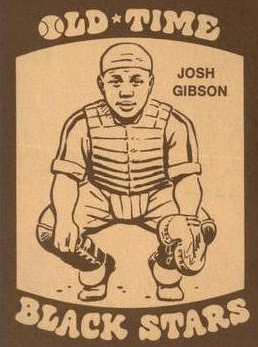
A PSA 9 (off-center) sold for $70
There has been a remarkable resurgence of interest in Negro Leagues stars in recent years, and rightfully so. We can point to two significant reasons for the positive reevaluation. First, there is a keen appreciation for the historical significance of the period. It is a testament to the harsh realities of segregation and the brave struggle of these players for recognition. Second, baseball historians and statisticians have reached a consensus that the quality of baseball in these leagues was equal to the MLB. Therefore, some of their stars are among the best to play the sport anywhere and anytime.
Josh Gibson is one of those players that appears to have been one of the best baseball players ever. But due to timing, he never played a Major League baseball game. Jackie Robinson was the first African American to break the color line on April 11, 1947. Meanwhile, Josh retired in 1946. He died of a stroke the following year and never saw how deeply appreciated he would become.
In 1972, Gibson was inducted into the Hall of Fame. But that was just the start of a new appreciation for the brilliant catcher. Stats from the Negro Leagues are patchy. But analysts have taken all the available information on his games and subjected it to regressions and means. As a result, today, we understand that Gibson was probably the best catcher of all time. Experts compare his fielding to Johnny Bench, but his hitting was miles ahead.
You can see why any card of Gibson's is a treasure. Granted, the 1974 Laughlin Old-Time Black Stars Josh Gibson #8 is not from Josh's lifetime. But it is a classic of 1970s baseball card production. The design is beautiful and straightforward. And the stark colors somehow capture the tragic story of one of the brightest talents ever, underappreciated only for the color of his skin.
The low price for PSA 9 is misleading for two reasons. First, it is an off-center copy of the 1974 Laughlin Old-Time Black Stars Josh Gibson #8 card, so it doesn't reflect the total value of a card with that grade will fetch. Second, the sale took place in 2017. So, before the COVID-19 hobby boom and the reevaluation of Negro League stars was in full swing.
1975 Topps Cleveland Indians Team (Frank Robinson Manager) #331
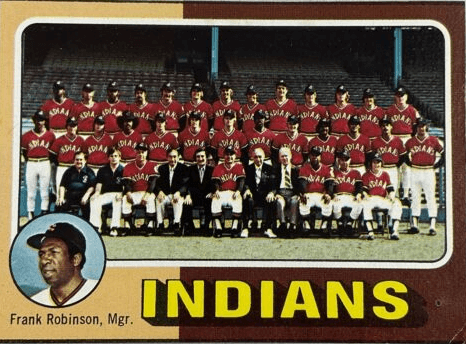
A PSA 10 sold for $1,025
The 1975 Cleveland Indians didn't exactly set the American League alight. They finished 15 games behind American League East winners, the Boston Red Sox. So, why is this card worth getting? Because the 1975 Topps Cleveland Indians Team (Frank Robinson Manager) #331 card prominently displays manager Frank Robinson in the inset and at the center of the picture. And that makes this card historical since Frank was the first African American manager in Major League Baseball history. A moment that was a long time coming.
The card used to be a bargain bin item. But the increased awareness of racial issues in American society has made this a more desirable and valuable card. The last PSA 10 sold for over $1,000. But that was back in 2019, and I would imagine it is worth several times that now. So getting a high-graded copy of this card before the rest of the hobby fully realizes what a treasure they have on their hands is a good idea.
Today, African American managers remain rare in baseball, although that department has made progress. Therefore, the card maintains its social significance. And it's a great-looking item as well.
1970 Topps Vida Blue RC/Gene Tenace #21
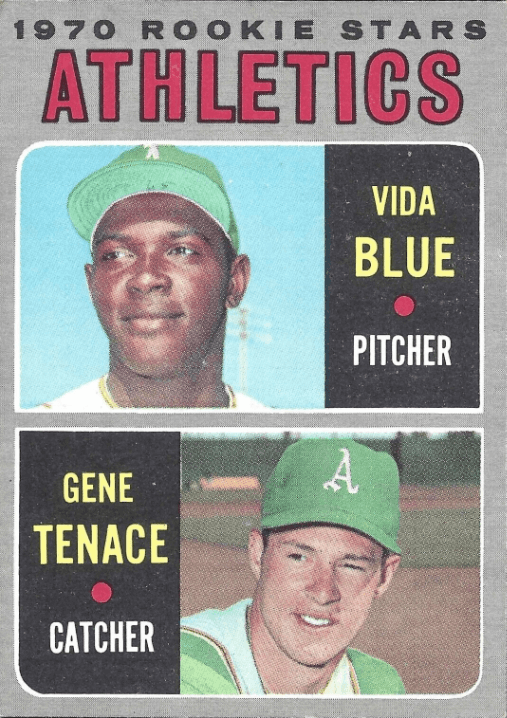
A PSA 9 sold for $1,050
Vida Blue was a dominant 1970s ace. His 1971 season was one of the greatest any pitcher experienced. Blue's ridiculous 24–8 record with a 1.82 ERA and 301 strikeouts won him both the Cy Young and MVP awards. He only had four good seasons, but they were absolute gems. But more importantly, look at that wry smile. What a heartbreaker!
What makes this card special is that, unlike most double rookies, both guys on this one were excellent players. Gene Tenace was an All-Star in 1975 and an essential player in four World Series titles. Three as an Oakland A, catching Vida Blue, Catfish Hunter, and Rollie Fingers. And another catching for the St. Louis Cardinals in 1982.
How good was Tenace? If you look at his traditional stats, Gene has an unimpressive .240 batting average. But with the advanced stats we use today, we understand how underrated this catcher was. His career 140 WRC+ is tied with Mike Piazza for the highest ever among catchers. So it's easy to see that his catching and hitting were a massive part of the quality behind those World Series-winning teams.
Not enough for you? No problem. Tenace also took his winning ways to manage. He coached that tremendous 1992 and 1993 Blue Jays team that won two titles in a row. So, if you are counting, that is six World Series titles. All told it is really time Cooperstown reevaluated his candidacy.
Either way, the 1970 Topps Vida Blue RC/Gene Tenace #21 card is one of the few double rookie cards with two absolute legends. Then there is the question of scarcity. There are only 20 PSA 9s on the card and zero PSA 10s. So, the few high-graded copies of this card will increase in value over time. And if you can get your hands on a PSA 10-worthy raw version, it will go for a fortune.
1975 Topps Rookie Infielders (Phil Garner/Keith Hernandez/Bob Sheldon/Tom Veryzer) #623
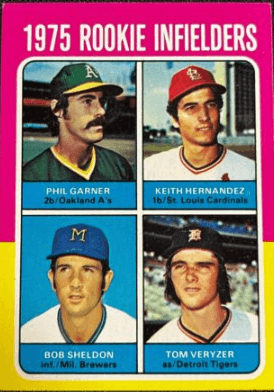
A PSA 10 sold for $3,225
With all due respect to the other guys on this card, we are here for Keith Hernandez. Perhaps the most important thing about this card is that it reminds us of why Keith grew that thick mustache he later became famous for. Clean-shaven is not your look, my guy.
Keith is widely considered the best defensive 1st baseman of his generation and one of the greatest of all time. He won Gold Gloves every year from 1978 to 1983. Unfortunately, his hitting was underappreciated, and Hernandez never made it into the Hall-of-Fame, despite being on the ballot from 1996 to 2004. But he never got more than 11% when Keith needed 75% to make it in. But advanced stats show he was a far better hitter than his contemporaries believed.
Furthermore, Keith has become a massive icon with New York Mets fans. He led the team to their last World Series title in 1986 and has been a TV commentator for their broadcasts for almost two decades. So, there is an excellent market for his cards. But I would go further. Gil Hodges finally entered the Hall-of-Fame in 2022, rectifying a long injustice. Keith Hernandez will make it, too, once the Veterans Committee gets a chance to asses his numbers. So, expect a leap in 1975 Topps Rookie Infielders (Phil Garner/Keith Hernandez/Bob Sheldon/Tom Veryzer) #623 card values in the future.
1971 Topps Dusty Baker/Don Baylor Rookie Card #709
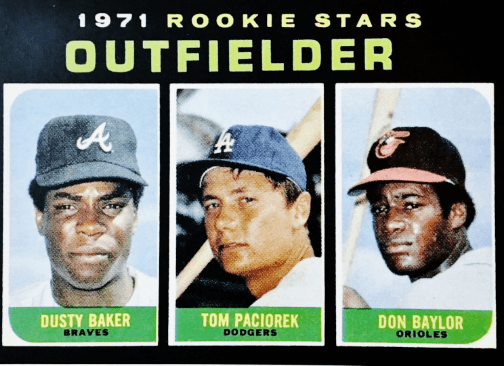
A PSA 9 sold for $5,100
You can already see I have a soft spot for these multiple rookie 1970s cards. And you should too. After all, why settle for one young guy with an oily face when you can have three? But with all due respect to Tom Paciorek (who?), all eyes are on Dusty Baker and Don Baylor for this one.
Let's start with Don Baylor. He had a few memorable years with the Yankees, which is suitable for his market, and was an All-Star and three-time Silver Slugger. Don was also an excellent manager. In 1995 he took the Colorado Rockies, then a miserable expansion team, and helped them to their first winning record ever. Baylor even won the National League Manager of the Year Award in the process.
As for Dusty Baker, where do you even start? He was an excellent player and an All-Star. But to me, that pales compared to Dusty's invention of the high-five. If that isn't a massive contribution to society, what is? And his incredible managerial career will likely see Baker make the Hall of Fame.
If so, we have two excellent and pioneering African American coaches on the same card. Along with the immortal Tom Paciorek (who?) on the 1971 Topps Dusty Baker/Don Baylor Rookie Card #709 card. What more could anyone ask for?
1975 Topps Rookie Outfielders (Ed Armbrister/Fred Lynn/Tom Poquette/Terry Whitfield) #619
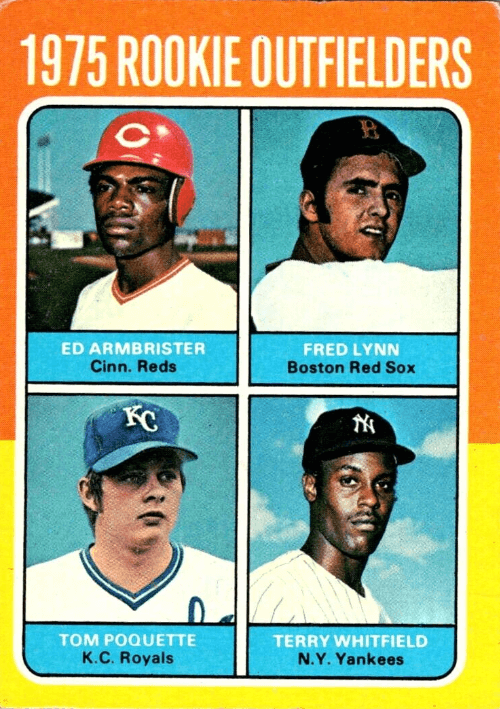
A PSA 10 sold for $6,432
The Fred Lynn rookie card enjoys some elements that make for a priceless vintage card. First, we have an underappreciated player from a team with a massive fan base. He was a two-way threat, winning four gold gloves and the batting title in 1979 with a .333. Among his many achievements, the Red Sox legend is the only player in history to hit an All-Star game grand slam. He had a once-in-a-lifetime experience at Comiskey Park in the 1983 All-Star Game.
Second, it has the right design. 70s card aficionados love those multi-rookie designs, and this one has a classic look. And Lynn has that hard-working player vibe in his pic. However, because the picture is cut, it's unclear what the outfielder is doing. Probably throwing the ball to the infield?
Finally, the population report will keep valuable the 1975 Topps Rookie Outfielders (Ed Armbrister/Fred Lynn/Tom Poquette/Terry Whitfield) #619 card. There are only 16 PSA 10s and 190 PSA 9s out of the 1,980 overall population.
1971 Topps Thurman Munson (All-Star Rookie) #5
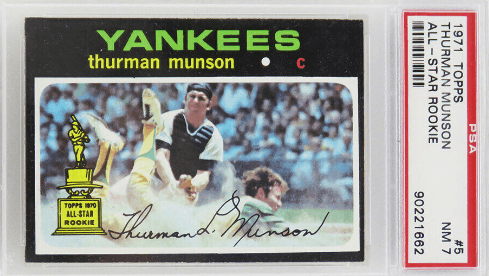
A PSA 10 sold for $11,000
You may wonder how a card that went for this much money could gain value. And anyway, not many of us can afford a PSA 10 to begin with. But you can get a PSA 7 1971 Topps Thurman Munson (All-Star Rookie) #5 for about $2,000, which is an excellent deal.
Why is a non-Hall of Famer card worth this much, you ask? Well, first, Thurman Munson has tremendous mystique among baseball fans. We are talking about an 8-time All-Star who died in his prime, aged only 32. To top things off, he played for the Yankees. That means Thurman has an exalted position among baseball's most significant fan base.
And the thing is, this card isn't even Munson's actual rookie. You have to go back to his 1970 Topps New York Yankees Rookie Stars #189 card, which Munson shared with Dave McDonald. But the action shot and design of the 1971 card are so perfect that it has become the graphic card of the catcher. It shows Munson waiting for the ball as Chuck Dobson of the Oakland A's slides into the home with a cloud of dust floating overhead. About as good a shot as I have ever seen on a card. The beautiful card will forever represent what could have been. Therefore, it is a very wise investment at any grade from a PSA 6 and up.
Final Word On The 7 Underrated Baseball Cards From The 70s That Could Gain Value
The 1970s are long over. Thank goodness for that, because we don't have to listen to disco music anymore. But the cultural relevance of some players from that period is only increasing. We gain a new appreciation for their achievements with the development of new stats. As time goes by, we also have a deeper understanding of the contribution some of these players and coaches had to social justice and creating a more equitable society. There is so much we can learn from history, and if we can collect awesome cards while we are at it, even better.